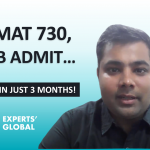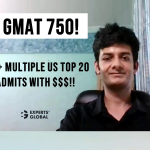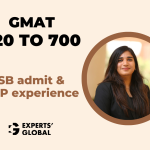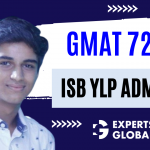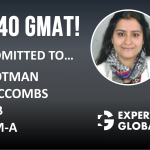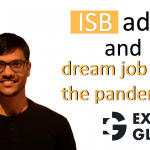Verbatim
Experts’ Global: Hi Sai, thank you for interviewing with us! Could you kindly share your story in your own words?
Sai: With an undergrad Computer Science background, I was naturally inclined to take the CAT and target an IIM seat. I joined the Bank of America right out of college, and after a few months there, took the CAT to start my MBA dream. However, my score was suboptimal, and I reassessed my goals, expanding my viewpoint on the schools I could target. Coming across ISB, I knew I had found a good option for me. My first GMAT attempt yielded a 680, and my prep had been lacking as I did not take even a free GMAT mock before the actual exam.
On my second go at the GMAT, I relied on prep material from Manhattan as well as discussions on GMAT Club. Even so, I did not use a singular GMAT online course, which looking back was an omission. Nonetheless, I bagged a 750 on my second GMAT attempt. I managed to secure an interview call from ISB, but completely botched it!
I was a little disheartened, but I did have a good GMAT score in hand, and felt like I should give it another go. Coming in contact with ISB admissions consultants Experts’ Global, I gained much-needed guidance through the application process, with helpful feedback on my school selection, essays, and interview strategy. However, I was unable to optimize my performance in the interviews yet again.
Taking a year’s break, I reoriented my outlook on improving my profile to look beyond just professional advancement. I joined Toastmasters and took on pro bono consulting for NGOs. This approach yielded results as I was able to secure a scholarship to CMU. Encouraged by the result, I applied to ISB yet again and with an added emphasis on my interview preparation, secured my dream PGP seat!
Experts’ Global: In hindsight, what mistakes did you make in the process, and what errors would you advise GMAT aspirants to avoid?
Sai: On my first attempt at the GMAT, I took Quant lightly because I thought my natural aptitude for maths as an engineer would carry the day. This led to a lower score for me on the Quant section on the actual test. I realized that I needed to work even on concepts that I felt were strong points of mine.
Taking GMAT practice tests with seriousness was something that I did not do, as I thought that performing poorly on any would dent my confidence. This omission led to a lack of confidence and second-guessing on my part on the actual GMAT day. I was also quite poor at Critical Reasoning, and made sure, on my second GMAT attempt, to focus on addressing this weakness of mine.
Experts’ Global: What were your lessons from managing the applications process?
Sai: My first time working on applications with consulting assistance, I applied to 13 schools, but ended up mismanaging the timelines. I missed out on applying to Harvard due to my habit of working on my submissions until the very last minute. Missing out on applying to a school reinforced for me the lesson that one should have the application ready to go at least a day before the deadline.
Managing the recommendations aspect of the applications was also challenging. Having an external dependency required me to be more up-front about making sure that my recommenders responded in time, but I failed to do so meticulously.
Experts’ Global: What can you tell us about your PGP experience?
Sai: The sheer variety of opportunities for personal and professional growth at ISB was astounding. For the first two terms, I was just adjusting to the overall volume of work and events going on all around campus. Gradually, I formed a network of peers at school with the same goals and interests as me. With a support system in place, I took the time to explore areas that only a business school would open up to me.
I participated wholeheartedly in case competitions, an investment that took me to Singapore, Hong Kong, Bangkok, and London. Regarding the job hunt, I omitted to sit for placements to work on my own business pitch instead, inspired by the healthy results I had secured in case and pitch competitions. That did not work out, but I was able to secure a growth-oriented product management role, and my confidence as an ideator gave me the edge in the selection process.
Experts’ Global: Can you tell us about your job search experience during the PGP? What tips do you have for future candidates regarding the same?
Sai: At ISB, the school provides you with a great deal of help for the job hunt. You get resume reviews and regular workshops on how to present your best employable self. In my case, I was not really sure of the role I wanted initially and thought that consulting would be a good field for me to enter. Focusing on what I really wanted to do was essential, as placements began six months into the PGP itself.
I would also like to let applicants know that the PGP in and of itself, in its core curriculum, will not necessarily transform your career prospects. You need to pick electives, develop alumni relationships, and participate in undertakings that all reflect your interest in a chosen field. Further, do not assess your program ROI on the basis of your pay in your first job after the PGP. It is in subsequent role shifts that your compensation grows exponentially. Just be patient.
Experts’ Global: Can you tell us more about your journey post-PGP? How did the entire pre-application phase and your PGP experience influence your growth?
Sai: From the GMAT itself, the pre-application process really prepared me for the PGP grind. Even the MBA interview prep helped me learn to be more cogent when telling my story. Overall, the application journey brought organization as a central balance into my life.
The PGP itself taught me to stand strong in the face of a rigorous workload. In my post-PGP professional life, I often find that even the most stressful days do not compare to the daily load of assignments and networking that each day at ISB carried. Further, I learned to build relationships of value in the PGP, a quality that helps me manage stakeholders even today.
Experts’ Global: What is your final message for our readers?
Sai: Make sure to research the different avenues to business education, such as the GRE, GMAT, and CAT for yourself. Reaching out to a renowned MBA admissions consultant is also a smart move, considering the sheer impact the MBA journey is going to have on your life. When you get feedback on your applications, through alumni conversations, or peer outreach, take it in stride and be honest about applying it to your work.
For those of you who have the financial ability, you can apply to certain schools multiple times because landing the best MBA spot you can always pays off in the long run.
Experts’ Global: Thank you for sharing your inspiring story with us, Sai!
Sai: I hope I can give others hope to succeed as well!

